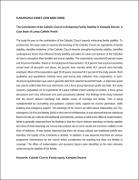| dc.description.abstract | KABARUNGI ANNET (2008-M092-20056)
The Contribution of the Catholic Church in Enhancing Family Stability in Kampala Diocese: A
Case Study of Lweza Catholic Parish
The study focuses on the contribution of the Catholic Church towards enhancing family stability. To
achieve this, the study seeks to examine the teaching of the Catholic Church on ingredients of family
stability, identifies initiatives of the Catholic Church towards strengthening family stability, identifies
contemporary factors that influence family stability and seeks the views and opinions of the Catholics
on how to strengthen their families and ensure stability. The respondents comprised 60 percent males
and 40 percent females. Based on the background characteristics, 92.8 percent had acquired secondary
school level of education and above, 60 percent were married while 45.7 percent were formally
employed. Most of the respondents aged 20-30 years comprised 34.3 percent of the study sample. Both
qualitative and quantitative methods were used during data collection from respondents. A semistructured
questionnaire was used to generate data from selected household heads, an interview guide
was used to collect data from key informants, and a focus group discussion guide was held. The study
covered a population of 70 respondents of Lweza Catholic Parish selected at random, 3 focus group
discussions and 5 key informants who were purposively selected. The findings of the study indicated
that the church delivers teachings that address issues of marriage and family. This is being
complemented by counselling and guidance, pastoral visits, support for income generation, skills
building and emergency support. The teachings of the church are silent about indissubility (15.7%),
monogamy (18.6%) and fidelity (30%) in the event of childlessness. It was observed that the underlying
factors for this are cultural and traditional commitments, poverty as well as the effect of modernisation.
What is generally observed from the findings is that the church delivers teachings on family stability
but some of these teachings are not put into practice due to some social and economic realities in the
lives of believers. It was further observed that there are strong cultural and traditional beliefs and,
therefore, the loyalty of the Christians is divided. In addition, it was observed that there are various
programme interventions by the church which complement the teaching but these are limited in
coverage. The effect of modernisation and economic factors were identified as the main elements
undermining the stability of the family.
Keywords: Catholic Church, Family equity, Kampala Dioceses | en_US |


